The police have the ball several days prior to kick-off at the Super Bowl, ensuring and tightening security across a 10- day operational span before game-day. Besides property preservation, fandom is already kicking before game-day. The Super Bowl Host Committee (holding the purse strings for public safety costs) confirms “downtown Minneapolis will be the site of the massive free ten-day fan festival leading up to Super Bowl LII on February 4, 2018” otherwise known as the NFL Experience.
Purely a sign of the times, no major event held at super-sized target-rich venues is immune to jihadi terror cells. It all drastically changed in September 2001. The post-09/11 police culture brought about a chronic litany of “extra-duty jobs” whereby cops sign-up for security work at stadiums, ports, bus terminals, train depots, and airports, to name a few of the largest ones. Smaller, sporadic jobs consist of churches, college graduations, and weddings.
Every day off from regularly-assigned duty, I put-in for extra-duty details…resulting in more food on the table and/or paying the karate school and gymnastics academy tabs.
The most sought-after extra duty gigs clamored-for by police are, hands-down, football games in biggie-sized stadiums drawing thousands of spectators. The buzz is definitely in the air.
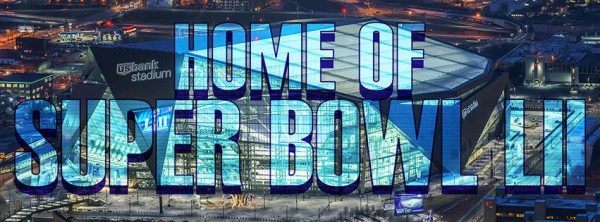
This year’s Super Bowl extravaganza is scheduled for February 4, 2018, at U.S. Bank Stadium in Minneapolis, Minnesota. This will be the second time Minneapolis hosted the Super Bowl, having previously hosted in 1992. And it’s going to cost $3.1 million for public safety officials to ensure a $1.03 billion stadium does not become a bullish rodeo or a terrorist’s epic maelstrom.
It’s going to cost $3.1 million for public safety officials to ensure a $1.03 billion stadium does not become a bullish rodeo or a terrorist’s epic maelstrom.
Therefore, the U.S. Department of Homeland Security considers the Super Bowl as a Level-One Special Event Assessment Rating (SEAR), recognizing the paramount investments in public safety realms. The Minnesota Chiefs of Police Association (MCPA) elucidated a SEAR Level-One event qualifies when it engenders “anticipated attendance by dignitaries, size of the event, significance of the event, duration of the event, availability of state and local resources, and multiplicity of jurisdictions (needed coordination).
“This designation means that Federal resources are made available to our area as well as Federal involvement and authority in the public safety planning and response. Responsibility for management of the actual public safety ‘boots on the ground’ operations still, however, rests with local law enforcement,” MCPA summed-up.
The Star Tribune and other Minnesota-based media report the all-too-common plague in a city whose football stadium is smack-dab in the middle of the metropolis of Minneapolis: Traffic! The Star Tribune wrote, “[Minneapolis] Insurance companies, banks, hospitals, law firms and other businesses are warning their employees to expect gridlock on the roads and mass-transit delays.”
Indeed, the annual Super Bowl gridiron brings gridlock with it, especially so in non-suburban environs where downtown space is at a premium. Parking garages and open-air lots will make out like bandits, and the cops will need Advil to quell the din and pangs born of I-wanna-do-it-my-way motorists. (I rarely remembered I had a whistle tethered to my uniform epaulette until I worked traffic posts at Tampa Bay Bucs games…and boy, did I ever get the round cork innards bobbling, thanks to what we called “motor mayhem”!)
“This is undoubtedly the largest extended public safety operation our area has ever experienced,” wrote Minneapolis Police Commander Scott Gerlicher, the public safety coordinator for Super Bowl LII, addressing logistics in an email to the Pioneer Press. “It is massive in size and scope and covers really the entire metropolitan area. It is larger than the (Republican National Convention), and the Super Bowl in 1992 was so long ago that it just wasn’t as big in scope as they seem to have become in recent years.”
“You’ve got public safety, you’ve got terrorism, you have human trafficking, you have professional criminals who come every year,” USC professor of homeland security and public policy studies Erroll Southers told the Star Tribune. “I hate to say it, but it is a Super Bowl for criminals, too. They see the opportunities and that is why the security must be so robust.”
“I hate to say it, but it is a Super Bowl for criminals, too. They see the opportunities and that is why the security must be so robust.”
Minneapolis PD is an agency whose sworn strength is roughly 878 police officers and 300 civilian personnel. Admittedly not nearly enough to work the entire Super Bowl shindig, the Minneapolis police force will be supplemented by other Minnesota law enforcement agencies and cops from other states. Other than city and Hennepin County deputies, those non-Minneapolis law enforcers who have no direct jurisdictional authority are conferred with powers of arrest before Super Bowl Sunday.
The law enforcement community in Minnesota hosted and participated in “a number of tabletop and practical exercises to assure that we all have a clear understanding of how to respond to any emergency or critical incident that could occur” in partnership with Federal police entities having “a significant presence during Super Bowl week,” reported the MCPA.
With nationwide jurisdiction, federal law enforcement assets allocated for the Super Bowl are offered by several of the alphabet soup of federal cop shops: FBI, DHS, and ICE will have agents on the ground, posted aerially, operating maritime vessels, with aviators protecting airspace. Ordinarily, a defined airspace restriction is publicized in advance so that commercial and private planes/helicopters plot proper courses. Throw drones in the mix and there is a potpourri of flying things to monitor and keep out of the specified zone.
As it has done for the College Football Playoff National Championship in Atlanta, the Federal Aviation Administration restricted flying Unmanned Aircraft Systems (drones) over the stadium. Expecting President Donald Trump to attend that night game, the US Secret Service coordinated with the Atlanta police and the Georgia Bureau of Investigation.
Peripherally, slightly more than two miles of concrete girding and fencing will envelop the Super Bowl stadium. Within and outside of the immediate fenced-off stadium will be hundreds of cameras linked-in and surveilled by law enforcement analysts. While the NFL will operate its camera system to dissect plays and project replays on mega-screens for fans and sports analysts to consume, police personnel and federal agents will be doing roughly the same thing but for different reasons.
Stadium Security Strategies
To custodians, stadium sweeps mean a massive cleanup of popcorn, peanuts and pretzels somehow coated by spilled beer. But to police officers, stadium sweeps have a lot to do with detection of harmful devices sniffed out by canines whose olfactory glands are the bomb. This year, the public safety action plan calls for 100 police canines to ensure the stadium and its periphery are clean from explosives. Patrons at the ticket-gate will get the once-over by a dogs super-skilled nose as well. Jihadis may not care for the gridiron but they sure do prey on the throngs of fanatics who do.
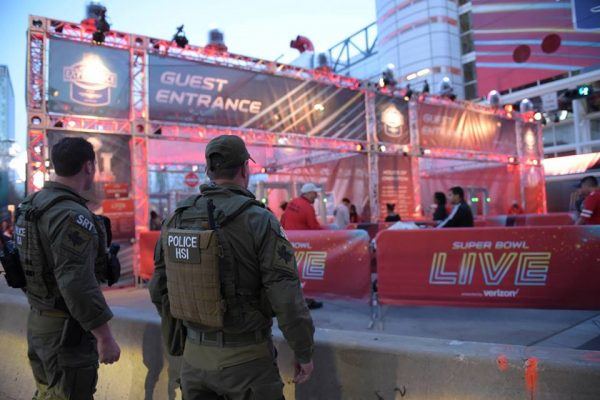
No bones about it: police canines hinder explosive efforts of terrorists. Along with canines from federal, state and local police agencies, thousands of cops will blanket the stadium area as well as throughout Minneapolis, performing various operational components towards one overall objective.
SWAT operators will be present, scores of uniformed police will be evident, and an undisclosed cadre of undercover cops will blend-in among the phalanx of tailgaters, sex traffickers (often associated with Super Bowls), and myriad merchandisers, some of whom tend to be counterfeiters gouging their way into fans’ pockets.
The Immigration and Customs Enforcement (ICE) faction will have “unmarked” federal agents roaming and checking would-be vendors and the wares they are marketing. Traditionally, hawks looking to capitalize on sales of fake football stuff such as bootleg jerseys, caps, bags, pennants, and even Super Bowl rings are typically part of the annual football fray. Like ticket scalpers: It is part of the game. What fuels scalpers? Police call it the “unknown variable”: the number of game-day folks who show up seeking last-minute ticket opportunities at usually exorbitant rates. That could mean anywhere from 2000 to 22,000 (or more) unexpected bodies in an already tightly-regulated area to taunt the span of control.
Cops may receive back-up from Mother Nature; significantly colder weather conditions may keep some people elsewhere to watch the game, lightening the downtown-Minneapolis load.
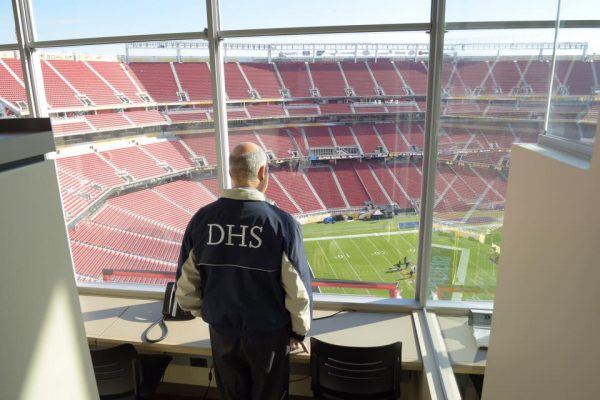
Super Bowl pre-game security sweep is a monumental task carried out by varying law enforcement specialists belonging to, synonymously, special teams…just like the ones which often take the field after it has been cleared repeatedly for weeks before game-time.
Spotters and snipers are part and parcel eyes in the sky during mass-scale events such as the Super Bowl. Homeland Security’s Special Readiness Team (SRT) agents essentially mimic eagle eyes keeping a fine fix on details, trained to hone-in on and thwart anomalies (terrorists or any gun-toting threat). Not an easy task to isolate and terminate a threat among thousands of swift-moving spectators, thus skill is paramount since there is no room for error.
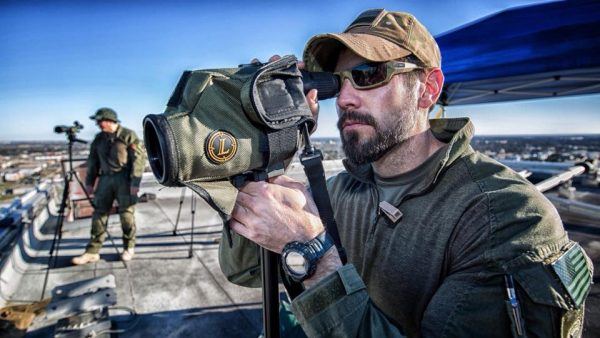
Minneapolis police Chief Medaria Arradondo has been attending meetings and planning engagements involving Super Bowl LII, reiterating the monumental logistics it takes for a successfully-safe event. The Public Safety Executive Advisory Committee incorporating police agency figureheads, NFL executives, and Minnesota Super Bowl Host Committee representatives was formed two years ago to develop a formidable logistical plan.
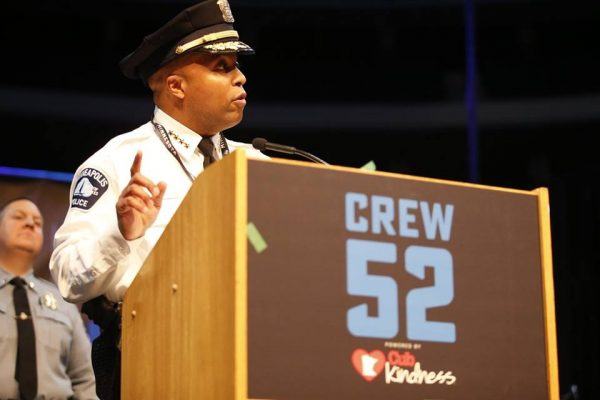
As early as 2016, the Minnesota Chiefs of Police Association (MCPA) law enforcement executives have been studying prior Super Bowl events and planning way ahead of the game, purporting their training and operational preparedness is akin to a “public safety operation which will involve a unified command structure consistent with National Incident Management System (NIMS).” OpsLens reported on the NIMS concept which was used during Hurricane Maria in Puerto Rico, depicting an operational plan by which all details are considered and resolutions are manifested in a comprehensive playbook.
Footing the Bill
If Super Bowl LII sounds like a gargantuan undertaking, that’s because it is. For the 2015 Super Bowl in Arizona, much of the public safety tab was picked up by host-area law enforcement agencies. Generally, any city competing to host the Super Bowl must agree to stipulations, one of which seems like extortion. To be granted host status, the city must embrace all public safety applications “at no cost to the NFL.”
In 2016, the Minneapolis city council voted to allocate $471,000 for a command center to serve as the conduit for all-things-Super-Bowl. Like many, I harbor resentment towards NFL arrogance.
The host committee task is to encourage private donors to defray the costs required for public safety and related operations by reimbursing local governments for the initial outlay.
The host committee task is to encourage private donors to defray the costs required for public safety and related operations by reimbursing local governments for the initial outlay. That tune sounds like fewer tax dollars expended for the NFL, a non-government organization reaping billions in revenue. According to Statistica.com, NFL pocketed $13.16 billion in 2016.
However, the sting is relatively relieved by the host committee concept; there is no guarantee it can ever fully reimburse all public safety expenditures. Aforementioned Glendale, Arizona played host to the 2015 Super Bowl and came out on the losing end. Glendale officials claim they took a $578,965 hit which the host committee was unable to reimburse since aggregating donor dollars in itself has no guarantee. Can you see why angst over Super Bowl public safety expenses may be a sore point? You’d think the NFL would be gracious enough and assume the public safety costs, but no.
In the 2016 pre-planning stage, Hennepin County Sheriff Richard Stanek said “the expectation will be that our expenses will be reimbursed so there is little or no expense to the taxpayer.” Indeed, for the sake of Minneapolitans, let’s hope the sheriff’s confidence is right.
Just before New Year 2018, the Minnesota Super Bowl Host Committee affirmed it raised a tad more than $50 million to sustain public safety costs.
According to a December 2017 letter obtained by the Star Tribune, outgoing-Minneapolis Mayor Betsy Hodges and Mayor-elect Jacob Frey requested Minnesota Governor Mark Dayton approve using the National Guard for Super Bowl LII, citing they are needed to bolster the police officers who “cannot by themselves meet all of the safety and security needs of the 10 days of Super Bowl LII while maintaining public safety operations for the entire city, even with the assistance that we will be receiving from other local law-enforcement agencies.”
Scores of cops partaking in Super Bowl LII will perform in customary fashion, despite the costs, the frigid climate, and the potential for jihad.
Nevertheless, the show must go on. And the scores of cops partaking in Super Bowl LII will perform in customary fashion, despite the costs, the frigid climate, and the potential for jihad.
“Our goal is to make sure when residents or visitors leave Minneapolis that they are saying ‘That was a great experience, not just from a party perspective, but I felt really safe,'” Minneapolis police Commander Scott Gerlicher told Twin Cities in an email. Commander Gerlicher is MPD’s Super Bowl public safety coordinator, working closely with state and federal law enforcement authorities to ensure the game-day festivities go off without any hiccups…at least not catastrophic ones.
After all, what’s a Super Bowl without beer-encouraged team pride influencing chest-bumping behavior by a couple of rivals?
















